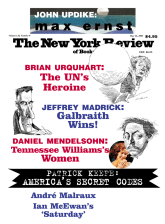In response to:
McCarthyism at Harvard from the February 10, 2005 issue
To the Editors:
I can add a postscript to Robert Bellah’s account of Harvard’s collusion with McCarthyism during the 1950s [NYR, February 10]. I had been a member of the Communist Party while a Harvard undergrad- uate. By 1950 I had dropped out of the Party, and had enrolled as a graduate student in Harvard’s Department of Social Relations. In March 1953, while employed as a teaching fellow (a Harvard Corporation appointment), I was subpoenaed by Senator Jenner’s Subcommittee on Internal Security, and asked to “name names.” I declined to answer questions, citing my Fifth Amendment privilege to remain silent.
This behavior led to my being summoned to an interview by the Corporation, Harvard’s five-person governing board. I made clear to them that I would not name names. I also informed them, truthfully, that I knew of no member of the Harvard faculty who was a member of the Communist Party. I explained that my use of the Fifth Amendment stemmed from legal advice that if I answered any of the committee’s questions, I would be compelled to give the names of colleagues—who, like myself, were guilty of no crime. Since naming them in public would expose them to unemployment, if not worse, I could not in good conscience do so.
The Corporation wrestled with a difficult decision. Was I guilty of “grave misconduct,” or merely “misconduct”? It had to be one or the other. The distinction between the two was important. If “grave misconduct” I would be dismissed forthwith from my teaching fellowship. If merely “misconduct” I would be allowed to finish out the remaining two months of my appointment—and I would not be reappointed. The Corporation opted for mere misconduct. The misconduct consisted of my exercising a constitutional right guaranteed in the Bill of Rights. For this decision, which left me unemployed three months before I could complete my Ph.D. thesis, Harvard was widely acclaimed as a bastion of academic freedom.
Happily, my research mentor, the late Professor Richard Solomon, held a research grant from a private foundation. He was courageous and generous enough to appoint me as a research assistant on that grant until I could complete my thesis. This was still a Harvard appointment, but not one requiring Corporation approval. I completed my thesis in September 1953, and was scheduled to receive the degree formally at the next convocation. But in January 1954, I was subpoenaed by the McCarthy Committee. McCarthy maintained that he was not investigating Harvard, but that since his committee franchise included oversight of defense plants, and Harvard accepted research grants from the Department of Defense, Harvard was in effect a defense plant—and I was an employee of Harvard. I was willing to answer any questions about my own activities, but I again refused to name names. This time I did not cite the Fifth Amendment, and based my refusal to name names on grounds of conscience. After this hearing at least one member of the Corporation voiced his concern that if the press learned that I received a Harvard degree after defying the McCarthy Committee, Harvard would suffer grave embarrassment. My mentor informed me that the question of whether I could be denied a degree had been raised—but evidently dropped.
Prior to my testimony at the McCarthy hearing, I was summoned to an interview by Dean McGeorge Bundy. Bundy made clear that he was in regular contact with the Boston office of the FBI, and that he had advance knowledge of my subpoena by the McCarthy Committee. He urged me to do my civic duty, and to name names. I informed him that I would not do so, but that I would no longer cite the Fifth Amendment. He felt that from the university’s point of view that was better than “taking the Fifth,” but again urged me to name names.
I did receive my degree, before I was indicted for contempt of the Senate. The indictment made me unemployable in the United States, but I was able to secure an academic appointment in Canada, where I worked happily for fourteen years. I stood trial in the United States on the contempt charge, and was acquitted on narrow technical grounds. By 1968 the political climate had changed enough so that Princeton University invited me to take up the chairmanship of its Department of Psychology.
My own case confirms Robert Bellah’s conclusion that Harvard’s reputation as a bastion of academic freedom in the dark days of McCarthyism is wholly undeserved. But like Bellah, I am deeply grateful to the many Harvard faculty members who supported me in a difficult time, and who contributed generously to my legal defense fund. That gratitude does not extend to Harvard as an institution.
Leon J. Kamin
Sea Point, South Africa
This Issue
May 26, 2005



